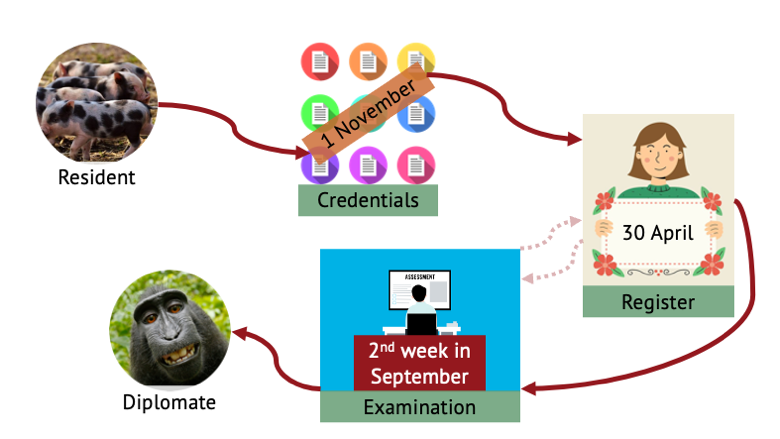Exam Process
Click on the diagram to read more about the process.

Apply
Submit your credentials application on or before 1 November to sit the exams the following September (this is to allow sufficient time for any appeals to be resolved). Download the application from our Forms page. Read more information on the credentials application process here.
Register
You must register to sit the examinations before the deadline each year. The registration forms are also on our Forms page. Once you have registered, you will be sent an invoice for the examination fee. This fee is non-refundable.
Exam
The written exams are held in September each year, using an online testing platform. You will be required to take your exam in person at an examination site with an invigilator present. The exams are generally held over 2 days.
Diplomate

If you are successful in passing the examination, you will become a Certified Diplomate of ECLAM, and an EBVS® European Veterinary Specialist in Laboratory Animal Medicine.
Re-sit exams
If you do not pass the examination, you are allowed to re-sit three more times, at a reduced fee.
ECLAM examination questions are meant to assess not simply factual knowledge, but whether a specialist-level candidate applies factual knowledge in working situations. The examinations are criterion-based; candidates are not compared with each other, but are individually assessed against minimum criteria set by the College for specialist status.
ECLAM strives to improve the quality of its examinations and procedures by rigorous item writing and editing, item analysis using classical test theory, multiple levels of review, and post-examination reflection and review.
Dates & Deadlines
Those who have been approved by the Education Committee must register before the 30th April for the examinations in the autumn.
Written exams are generally given over 2 days during the second full week in September.
Exam Structure
The certification exams are in written format. There are multiple-choice and essay questions.
The examinations are marked within 2-4 weeks, depending upon the number of candidates. After approval by the Council, all candidates are contacted on the same day to advise them of the outcome.
Fees
Fees are shown on our fees page. The full fee is charged when you register for your first exam. If you fail the written exam you may re-sit for a reduced fee. All fees are non-refundable.
Re-sits
If you do not pass an examination, you may re-sit three more times. You must complete all parts of the examinations within 8 years of finishing your training.
Certification Examination
Written examinations cover all aspects of the ECLAM Learning Objectives via an online system. Examination candidates must install the FastTest plugin on their laptops prior to the examination, and take a short practice test.
On the day of the exam, the candidate is given the password to unlock the exam. FastTest will prevent the laptop from accessing the Internet until the candidate indicates they are finished (or when the allotted time expires), at which point FastTest uploads the completed exam and returns the laptop to its original state.
All examinations are conducted in English. Candidates may bring a translation dictionary (not a medical dictionary).
Content and passing score:
- Multiple-choice questions: approximately 100 questions, with a few included as un-scored ‘field test’ questions for future use). Time allowed: 4 hours.
- Essay questions:
- Short-answer: 20 questions each worth 5 points. All must be answered. Expected length is 200-300 words (less than one page). Time allowed: 4 hours.
- Long-answer (two sections): 2 questions in each section, each worth 25 points. Expected length is 1200-1500 words (2-3 pages). Time allowed: 2-3 hours for each section.
- The score required to pass the certification examination is 55% of the total score on all 3 sections (165 out of 300 points).

Candidates may appeal an adverse decision of the College by adhering to ECLAM’s Appeals Policy and Procedures.
